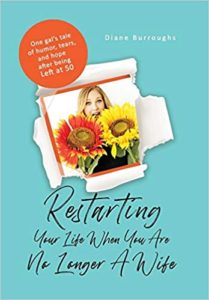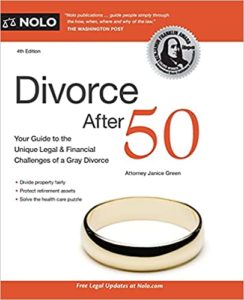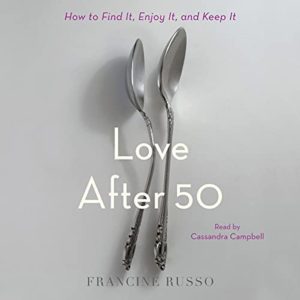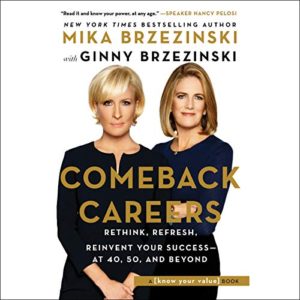How to survive, heal and thrive after divorce at midlife
“It’s not easy to make life changes, particularly if you are set in your ways. However, life is full of ups, and downs-learning how to handle negative experiences is the key to a healthy outcome. Seldom can an individual successfully navigate the negative experiences alone; we all need help. But it is still up to the individual to decide how they will travel on this journey and write their ‘book of life.’”
“Mourn the loss or celebrate it. Adapt, exist, or regress. Learn more about yourself and your inner strengths or choose to remain unenlightened. Rejoice in your evolution and the new opportunities coming your way or fear change. Play a role in your destiny or relinquish all control to the Fates. Just remember, it really is your story to write. Hopefully, it will reveal a life lived fully and happily.”-Shoba Sreenivasan, and Linda E. Weinberger. Emotional Nourishment.
These two quotes are the essence of the present post and embody my way of thinking regarding divorce at midlife.
The “gray divorce”-divorce between age 50 and 59- rate doubled from 1990 to 2010, and it’s remained at that level ever since. Researchers have found that more than 1 in 4 people getting divorced in the United States is over age 50, and over half of those divorces happened after 20 years of marriage.

The present article will help you understand that facing divorce at age 50 and beyond doesn’t have to be traumatic or a tragedy. On the contrary, it could be the best thing that happened to you. After presenting the important and interesting facts about divorce at midlife, I will list the reasons why divorcing at 50 is certainly not the end of the world. Keep reading for advice on how to navigate this new life’s episode.
Disclaimer: This post contains affiliate links. Should you purchase a product through those links, I may earn a small commission at no additional cost to you. I stand behind all the products I promote.
For women, surviving divorce after 50 teaches some surprisingly positive lessons.
Regardless of your circumstances, when you or your spouse decide to separate, divorce doesn’t have to be the end.
Life is a sequence of challenges. The key is how to react, face, or deal with those challenges. Looking at divorce from a positive mindset will help you see it as the end of a cycle and consequently the beginning of a new phase, promising and full of opportunity. Ultimately, things always happen for a reason.
Divorce for women over 50 gets a bad rap. We have this cultural conditioning where we tend to see a divorced woman left with nothing. Many people still think that she has nowhere to turn and has no clue what to do with the rest of her life.
The process of ending a marriage, especially a long one, can shake up your life in all aspects. No one makes the decision to get divorced at this stage lightly. The practicalities themselves are daunting issues around healthcare, and retirement is much more pressing; assets become harder to split. It may come as a terrible shock (if it wasn’t a mutual decision) for the person being divorced-and for the initiator, there may be guilt, along with an element of sadness.
Before getting into the advice on how to get through the adjustment period with your strength and sanity, plus the list of all the positive things that come with divorce at this stage in life, let’s look at the more significant facts.

Important and interesting facts about divorce at midlife
- Possible implications for divorce in women this age include:
Unhappiness
Emotional estrangement
Financial worries
Empty nest syndrome
Parent care
Sexual disfunction
- Psychological issues among recently divorced people from long-term marriages because of coping with multiple co-occurring stressors (particularly for women)
Depression
Stress
Mourning
Anger
Perception of one’s health
- Differences between men and women regarding midlife perception
For men, the second half of life can feel like a reduction. Physical strength is waning. Authority at work may be less. Sexual appetite and ability can be more complicated. Less hair, less energy, less respect, fewer choices.
For women, midlife often looks more liberating. The children are grown or nearly grown. She may have a decent salary and, therefore, more disposable income. She is likely still healthy and active. Her body is changing and maturing in ways our sexist, ageist society disapproves of, but she cares less about the opinion of others, which is the biggest liberation of all.
- 66 percent of divorces for people over 50 were initiated by women
Unlike their mothers and grandmothers, who may have stayed married out of economic dependency, boomer wives are more likely to be financially independent.
More so than men, women begin to look back on their lives and think about what their interests and passions were before marriage.
Over the years, women give up a great part of their life for their children, their husbands, and their work. You are left wondering, “Where is the part that’s left for me?
- Our cultural script or expectations for what constitutes marital success have changed
A good marriage is now defined by questions such as “Does this marriage makes me happier as a person? Or, “Is my marriage contributing to my self-fulfillment? If the answer is no, then divorce can be viewed as an acceptable solution.
Again, women are now more economically independent, giving them an alternative pathway out of an unsatisfying marriage.
- People are living longer
Finally, older divorce may be more common than any other time in history for this relatively simple reason. If you survive to age 65, you may live another 20 years, which is a long time to spend with someone you are no longer happy with.
Basic tips to get to the adjustment period: Transition from marriage to singlehood
Divorced can leave you depressed, lonely, financially strapped and wondering, What now?
You may feel like you will never get through it because you are turned upside down. The good news? The chaos won’t last forever. Like everything else, it will pass.
You must approach this transitional period with an open mind and great hope.
There are ways that help women heal and consequently rebuild their lives.
Let yourself heal
The breakup of a marriage is like a death, so it’s natural to mourn the life and lifestyle you have lost. Take your time; go bit by bit.
Let blame and bitterness go
No matter who initiated the split, it’s important to recognize the futility of blame. It doesn’t change anything. By holding on to anger or bitterness, the only person you are damaging is yourself.
Keep a journal
Writing about your emotional struggles may reduce some pain. It provides perspective in a clear, effortless way. If nothing else, journaling every few days tracks your healing.
Lean on friends
Just talking it through with close friends can be enough for some women. Rely on close friends to prevent doing anything stupid or rash.
Seek professional support
Sometimes is hard to get motivated about life on your own. An experienced therapist can give you coping tactics and help you find a path ahead if you are deeply hurt. Divorce is a process, and having a professional outline that fits you is useful.
Connect with your adult children
Divorce can affect adult children as much as young children, sometimes even more. They may question their upbringing and their very sense of identity.
Regardless of who initiated the divorce, be sensitive to your adult children’s needs. Retain the parent-child relationship.
Practice self-care
Your physical health is the basis for everything else, don’t ignore it. As we get older, we can no longer take our health for granted. It might be tempting to comfort eating, excess drinking, etc., to get through the stress of divorce, resist!
Regular exercise, healthy eating habits, and plenty of rest will improve your mood and overall outlook.
Accept what you can and cannot control
There are always going to be things out of your control, and any attempt on your part to change that will inevitably result in further frustration and unhappiness.
You cannot control what your ex-spouse or anyone else says, thinks, or does-but you can control your reactions. Accept that you can’t change what’s past, but the future is entirely in your hands.

REASONS WHY DIVORCING AT 50 IS NOT A BAD THING
Divorce can be an awesome occurrence, especially as you get older. Divorce at midlife could give you a new lease on life while your best years are still ahead.
Here are some incredibly positive reasons why divorcing at midlife could be a good thing:
- You will be happier
A bad marriage rarely makes people happy. Staying together with your spouse for the kids, financial benefits, or simply because you are scared to be alone will leave you with a life full of regrets. There is research that revealed that most divorced women studied did not regret their decision to end their marriage and found themselves happier living the single life.
- You will have time to pursue new passions
Without the baggage of a deteriorating marriage holding you back, you will have plenty of time to do the things your partner didn’t want to.
- You may discover a whole new side of yourself
For many years you have been part of a couple. It’s easy to end up suppressing some aspects of oneself when in a decades-long marriage. For years we defined ourselves as wives, mothers, partners, and always part of a unit.
Now you are once more a unit of one, an “I,” and it might take some getting used to. At first, things seemed scary because we were not used to them. But gradually, as we start to enjoy new pursuits, we may have discovered that they are opening the door to a whole new world for us.
A world we could start defining ourselves as businesswomen, entrepreneurs, amazing friends, world travelers. New, richer self-identities emerged that in an earlier life we never thought possible.
You will be reinventing yourself in what could be the next chapter in your life.

- Changing your relationship status sparks other changes
Making a substantial change, like deciding to divorce at 50 or older, can often be the catalyst for smaller changes, too. If you have been feeling unmotivated about making a career change, renovating your home, or just adopting healthy habits, the opportunity for reinvention a divorce offers might just kick things into gear.
- Being alone can be amazing
One of the reasons many of us chose to stay in an unhappy and unhealthy relationship was that we didn’t want to be alone.
However, as the divorce progressed, we discovered that we liked coming and going as we pleased. There was no partner to worry about. In short, the ability to set our own schedule and run our homes and lives without worrying about our spouse is liberating.
The feeling of freedom starts to replace that fear of being alone.
On the other hand, spending time alone post-divorce will provide the necessary time to self-reflect on your own contributions to your relationship’s demise, making it easier in the end to change those unhealthy habits.
- You’ll gain confidence
When you don’t have a spouse to prop you up, you’ll have to figure out how to muster confidence all on your own. Fortunately, many men and women find themselves more confident in their bodies, in the bedroom, and their careers in their 50s than they did earlier in life. This newfound confidence makes it a whole lot easier to feel good about your post-divorce life.
- You’ll have more time to spend with friends or you can make new friends
Your friends are still there, and they are as awesome as you remembered. When you divorce at midlife, you finally have time for them.
For some newly divorced women, their married girlfriends may not want to spend as much time with the “single” you. That’s why you’ll need new single friends.
You are part of a different social pool now, so surround yourself with similar people.
- You’ll realize you can do things that scare you
After spending years with a date on your arm, the prospect of doing things alone can be scary. However, you might find you enjoy those leisure activities (such as having a drink or going to a museum alone) more without a spouse. Some studies back this up.
- You can start dating again
Older relationships bring less pressure. By the time you are in your 50s, the expectations of a relationship aren’t the same as when you were at 25. By this age, most people who want to get married or have kids have already done so. This allows new relationships to progress at a more natural pace without the “where is this going?” mentality creeping in.
In fact, many older divorced women prefer to keep it light and have fun. You don’t need to find a soul mate, just someone pleasant for dinner and a movie.
- You should celebrate being single
When you have come out to the divorce darkness, celebrate the occasion. Take a trip with girlfriends, kids, or by yourself if you can afford it. Or throw a divorce shower to have fun with your close friends.
A celebration marks that you are moving forward with your new life.
Closing thoughts
The dissolution of a marriage is not a trivial event. It is a major life stressor regardless of age and duration of the marriage. Personal and social interactions are critical as they not only provide support but also offer an opportunity to others to observe the divorced person’s mental and physical health.
With that said, divorce can also transform us. Something we didn’t think we could ever survive, let alone prosper through, can mold us into the heroines we never knew we could be.
Instead of feeling like you have failed at marriage, you will come to realize that divorce is simply another step toward success in life.
Divorce can help us learn unexpected lessons about ourselves. We may discover new identities, embrace our time alone, and realize our own strengths.

